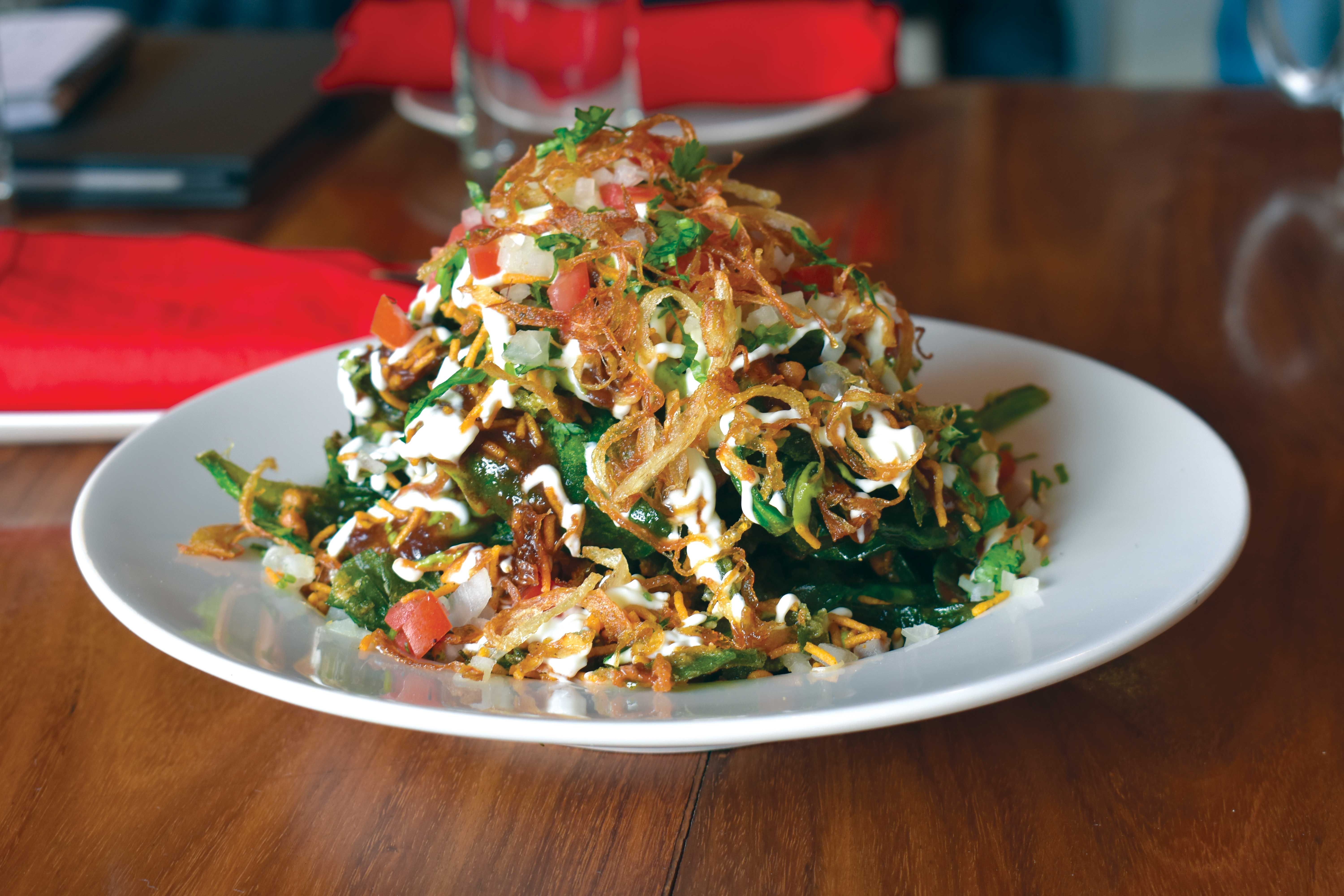An unexpected encounter with a motivated and fearless mountaineer
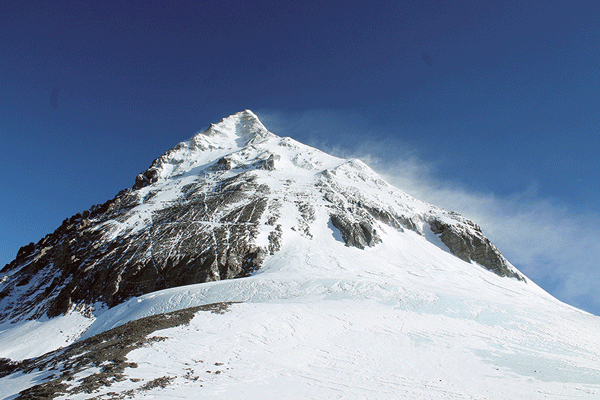
Recently, I was asked to visit Bhotang, in Sindhupalchok district. The area was hit very badly in the 2015 earthquake; eighty-five percent of the houses vanished, and with that, many lives and livestock. I was working sixty kilometers away, in the area of Aandhimul (Tanahu), which although very close to the epicenter, was luckily spared, with only a few houses being seriously cracked. So, we decided to send a percentage of the funds that had been donated for reconstruction to the “Bricks for Bhotang” project to rebuild a school. The project coordinator in Australia put me in contact with her niece in Kathmandu, Kanchi Maya Tamang, who offered to accompany me to Bhotang. It was monsoon season, and traveling in rural areas becomes even more difficult than usual, and Bhotang is a day’s journey each way.
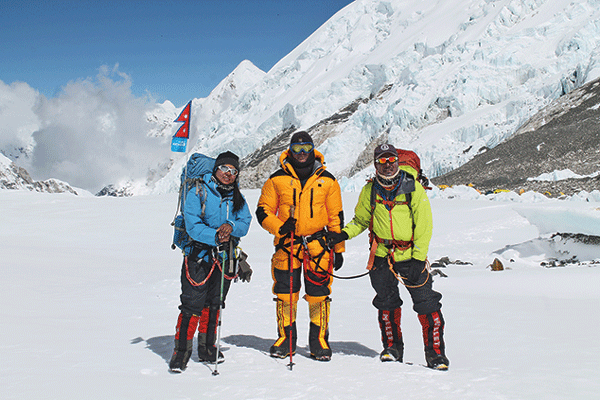
Kanchi Maya, a young lady with a warm smile, introduces herself to me. We start discussing when it is best to leave for Bhotang, when I realize that the season and time is just not right, and that it would be much better to go later in the year and spend a few days there. The area has five or six schools, one of which is very far, meaning that no organization has supported the re-build. I realize I really want to see this Buddhist area and visit all the six schools. This would probably take one week, a week which I don’t have, as I’m leaving the country soon. So, we rescheduled the visit to Bhotang for September.
It’s only after we finish the ordinary chit-chat and planning that an extraordinary story comes out. I am glued to the chair and feel like a small child asking more and more questions. This very humble lady sitting next to me stood up on the summit of Mt. Everest on the morning of May 21, 2017, the first woman from her community to achieve such an amazing feat. Her purpose was to bring awareness about the terrible crime of women trafficking, which she had a very close encounter with.
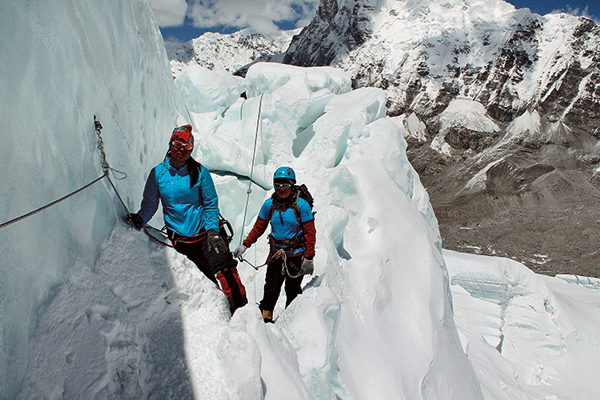
Coming from a very poor community, and the youngest of her family, she started working in India for just 2000 INR per month. Later, as many other Nepalis, she dreamt of going abroad. Arriving in Egypt, she was soon working very long hours, often till 1:00 a.m. This highly-paid job earned her 350 USD per month. She soon noticed that some Nepali girls were treated badly; some were locked up in a basement, or were paid as little as 150 USD per month. These women were unable to leave, as their passports were taken away from them. Most were too afraid to talk to anyone about their plight, and for some, the truth will be buried deep down, never to be revealed, too painful and shameful to see the light. Kanchi Maya helped save one young Nepali girl’s life by arranging for her to escape and finding another family to work for. She said if she hadn’t done that, the girl would have most likely died, as she was left with no food for several days. After six years of working hard, Kanchi Maya’s wages increased; she tells me she was lucky to have a nice family to work for. But, her deep desire was to return back to Nepal and make others aware of the poor conditions in which particularly Nepali women are often treated, and not only abroad. She decided that she would help them—and herself—find their voices and a path forward to new possibilities by taking the brave step of climbing Mt. Everest.
Back in Nepal, Maya’s success partially lay in the hands of Pemba Dorje Sherpa, record holder of the fastest ascent of Everest, and her personal guide. She practiced running and cycling every morning as part of her training program, beginning in October 2016. Fundraising in Nepal resulted in almost 20,000 USD towards the cost of her expedition, along with additional sponsorship from a UN program focused on empowering women. She said, smiling, “I was lucky not to have to pay another 15,000 USD, thanks to Sherpa Shepherds Expedition and Pemba.” He taught her climbing techniques, and they practiced on the 6,000 m Mera Peak, before attempting the brave journey to the summit. Kanchi Maya tells me in detail the steps of each part of the route, and how they had to stay in Camp 4 for three days. When there, she found she would need to pay 1,000 USD for one bottle of oxygen, or go down. Pemba advised her to return, but she was determined not to give up. She ordered another five oxygen bottles. Money was not the most important issue, she had a message to bring equality to women, and a will to go all the way. After three days of bad weather, they finally made the push to the summit. They began on the evening of May 20, finally arriving at 6:00 a.m. the following morning. She had done it. “I was so happy! But, the most difficult part was the descent, as you have exhausted all of your energy going up, and coming down is very steep”—here, she demonstrated the angle with her palm, “You have to walk down, but as you are wearing an oxygen mask and sunglasses, you can’t see where you are going. This part is dangerous.”
She reveals that her dream is to climb all the 14 highest peaks, to move into tourism, stay in Nepal, and set up an all-women organization. Since this first experience, she has climbed the Ramdung Peak with an all-Nepali women’s team: there are single mothers, women returning from working abroad, and some who were already female mountaineers, on her team. She will lead the next expedition to summit Everest in 2018, and any Nepali woman can join her team. She is passionate to spread the message of women empowerment, encouraging them to step out, and leading in a new direction in quite a brave way for Nepal. She told me, “Once I am up there, I have no fear.”
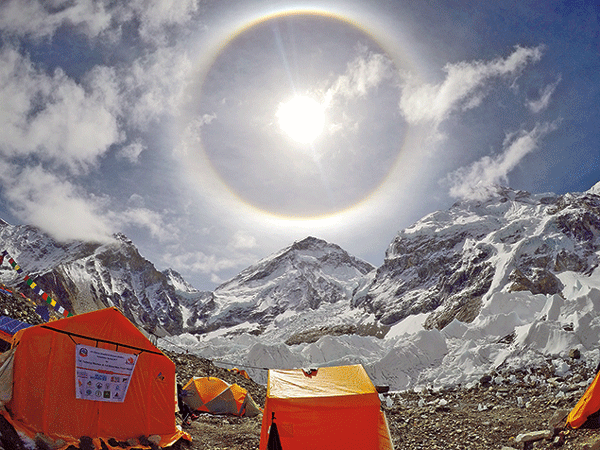
I feel more than lucky, totally inspired by what I thought would just be a practical work meeting, and I end up asking to take a picture with her in front of the Boudhanath stupa—just in case I am daydreaming. One of Nepal’s peculiar gifts is the serendipitous way you often run into the most unexpected people. Kanchi Maya leaves me with this sentence, “We need money, but it is not everything.” I agree with her wholeheartedly and give her all my respect, not just because she has climbed Everest, but because of the humble and graceful way she carries herself and the simple understanding that we are all human beings who should be treated equally, and with respect.





